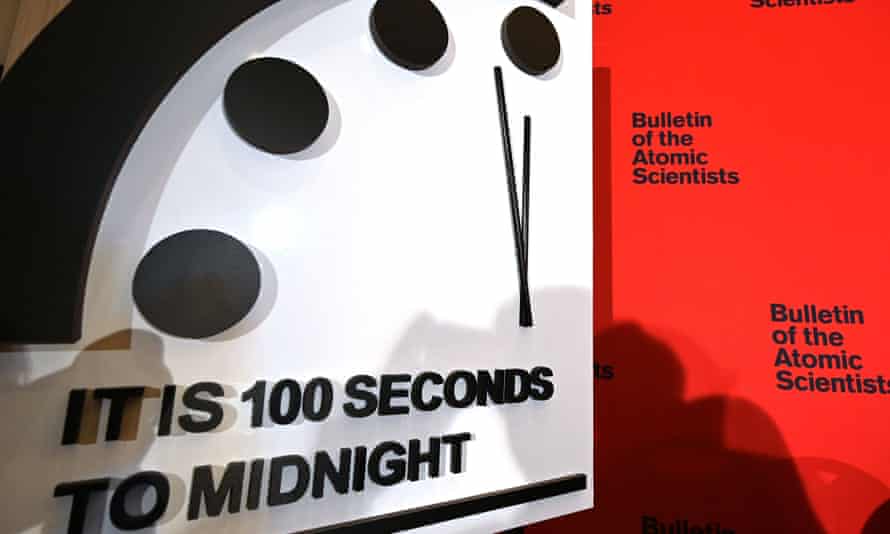Extract from The Guardian
The Bulletin of the Atomic Scientists’ measure of the world’s vulnerability to catastrophe, remains at 100 seconds to minute

Last modified on Thu 28 Jan 2021 05.27 AEDT
The election of Joe Biden could be a step towards a “safer and saner world” but the planet remains dangerously close to nuclear and climate change catastrophe, at “100 seconds to midnight” according to a panel of top scientists.
The Bulletin of the Atomic Scientists announced that the hands of its “Doomsday Clock”, a measure of the “world’s vulnerability to catastrophe”, had not moved since last year.
“The pandemic revealed just how unprepared and unwilling countries and the international system are to handle global emergencies properly,” the Bulletin, co-founded in 1945 by Albert Einstein, said in a statement.
It added that the worsening spread of disinformation and conspiracy theories was acting as a multiplier to the worsening threats of nuclear conflict and the climate emergency. The statement did not mention Donald Trump by name, but pointed to the 6 January storming of the US Capitol, which was incited by the former president, saying it renewed “legitimate concerns about national leaders who have sole control of the use of nuclear weapons”.
“In 2020, online lying literally killed,” it added.
The statement welcomed Biden’s first steps as president, rejoining the Paris climate accord and extending the New Start arms control agreement with Russia for five years.
“The election of a US president who acknowledges climate change as a profound threat and supports international cooperation and science-based policy puts the world on a better footing to address global problems,” the Bulletin said.
“In the context of a post-pandemic return to relative stability, more such demonstrations of renewed interest in and respect for science and multilateral cooperation could create the basis for a safer and saner world.”
But it raised concerns that plans for economic recovery around the world lacked the needed emphasis on low-carbon investment
“In aggregate, the G20 countries had committed approximately $240bn to stimulus spending that supports fossil fuel energy by the end of 2020, versus $160bn for clean energy,” the statement said. “At present, national plans for fossil fuel development and production are anything but encouraging.”
The statement was drawn up by the Bulletin’s science and security board in consultation with its board of sponsors, which includes 13 Nobel laureates.
It said that despite the extension of New Start, the nuclear modernisation plans of the major nuclear powers raised the risk of a nuclear conflict being sparked by miscalculation. It pointed to the development of hypersonic glide vehicles, ballistic missile defenses and missiles that can use both conventional and nuclear warheads, as raising the risk of mistakes.
“Donald Trump was an accelerant for existential risk. We got lucky – and you’d be forgiven for breathing a sigh of relief now that he’s gone,” said Derek Johnson, head of Global Zero, a nuclear disarmament advocacy group. “But ‘safer’ isn’t ‘safe’. The Doomsday Clock was within striking distance of catastrophe long before a reality TV host was handed the nuclear codes. It will stay that way until nuclear weapons are taken off the board entirely.”
No comments:
Post a Comment